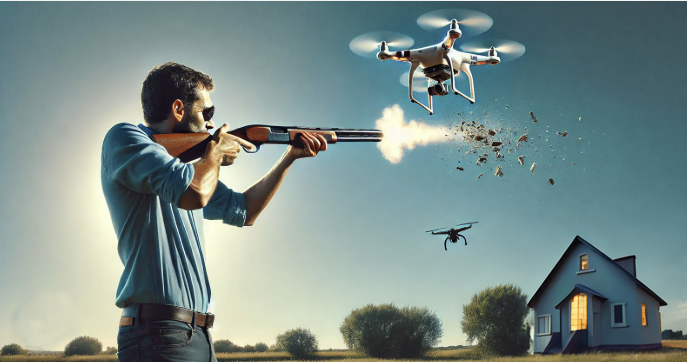Shooting at Drones is a Federal Offense
- The Importance of Understanding the Legal Risks: Shooting at Drones is a Federal Offense
In the midst of growing anxiety over the rising number of drone sightings in New York and New Jersey, it is essential to remember that reacting to these drones with violence—particularly by shooting at them—is not only dangerous but also illegal. The Federal Aviation Administration (FAA) has made it explicitly clear that shooting at any aircraft, including unmanned aircraft systems (UAS), or drones, is a federal offense.
The FAA has strict regulations in place for the safety of all aircraft in U.S. airspace, and this includes drones. According to federal law, any individual who discharges a weapon at an aircraft, manned or unmanned, is subject to severe penalties, including criminal prosecution. This is not limited to military or commercial aircraft but extends to any flying vehicle, whether it’s a drone in the sky or a private airplane.
Why is this a Federal Offense?
The reasoning behind such strict regulations is straightforward—shooting at aircraft, even drones, poses significant risks to public safety. A drone, although much smaller and less powerful than a traditional airplane, can still cause serious harm if it is hit or damaged in flight. A drone that is struck by a bullet could lose control and crash, potentially causing property damage, injury, or even loss of life. Additionally, the debris from a downed drone can pose a hazard to other aircraft or pedestrians on the ground.
The FAA enforces these laws under the Federal Aviation Act and other related statutes, which consider the safety of all air traffic, whether manned or unmanned, to be of the highest priority. Anyone who shoots at a drone—or any aircraft—faces a maximum fine of $250,000 and up to three years in prison. These laws apply to drones that are flying legally within the nation’s airspace, and even attempting to disable or bring down a drone is considered a violation.
The Consequences of Vigilante Action
The temptation to act out of fear or frustration in the face of an unknown or unsettling drone sighting may seem understandable, but it is critical to remember the legal consequences. Individuals who choose to shoot at drones—whether in self-defense, out of suspicion, or in an effort to stop a perceived threat—could face hefty legal penalties, including prosecution and jail time.
It’s also important to note that, in many cases, the drones being spotted may not be performing illegal or threatening activities at all. Most commercial and private drones are operated by hobbyists, photographers, or researchers, and many of the recent sightings could be innocent or misunderstood. Engaging with these drones in a violent manner only complicates matters, turning a potentially harmless situation into a legal nightmare.
The Bottom Line: Safety First, Law Second
In these uncertain times, it’s easy to let fear and panic drive decisions, but it is crucial to remain calm and act within the bounds of the law. If you encounter a drone that you believe is flying unsafely or in restricted airspace, the appropriate response is to contact local authorities or the FAA—not to resort to vigilante actions like shooting at the drone.
The FAA has robust mechanisms in place to investigate and address illegal drone activity, including safety hotlines and drone registration databases. Citizens should report any suspicious or dangerous drone activity to the appropriate authorities, who have the proper training and resources to deal with such incidents.
By understanding the legal framework surrounding drones and the consequences of taking matters into your own hands, you can help ensure a safe and lawful resolution to any drone sightings. This is not only important for maintaining public safety but also for preventing unnecessary escalation and potential harm.
Conclusion: Be Informed, Stay Safe, and Follow the Law
While the surge in drone sightings in New York and New Jersey has undoubtedly raised concerns, it is crucial that the public remains informed and level-headed in response. The legal ramifications of shooting at drones or any aircraft are severe, and the FAA will not hesitate to prosecute those who violate airspace laws. By reporting suspicious activity through the appropriate channels and relying on authorities to handle potential threats, we can help ensure both public safety and the continued responsible use of unmanned aircraft systems.
As we continue to navigate the mystery surrounding these drone sightings, it’s important to remember that while vigilance is necessary, the law must always be respected. So, whether you’re observing a drone overhead or discussing the issue with others, remember that the safest and most lawful course of action is to allow the professionals to handle the situation.

